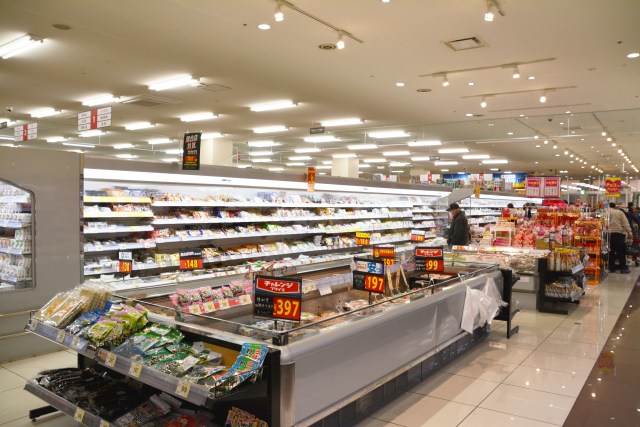
There’s a reason why they don’t play other kinds of music!
If you’ve ever been to a Japanese supermarket like Ito Yokado, Aeon, Seiyu, or Max Valu, then you’ve probably noticed the elevator-style music they play on the speakers throughout the shop. Well, maybe it’s a bit cheerier than elevator music, and sometimes synthesized, but it’s definitely generic and so nondescript that you almost don’t notice it until you realize you’re humming it on the way home.
▼ Music like this
This kind of music is actually used not just in supermarkets but also in electronics specialty shops, discount stores, hundred-yen shops, and lots of other kinds of stores. You probably think its only purpose is to provide some background cheer, and maybe to keep the store from feeling awkwardly quiet…but you’d be wrong.
Japanese netizens say that this “cheap”-sounding music was specifically chosen for a reason. According to Twitter user Keisuke Fujita (@sato310sss), who saw a TV segment about it, the music of grocery stores is actually intentionally crafted to subconsciously encourage customers to shop there.
▼ Translation below
テレビで浅倉大介が「スーパーマーケットでチープなBGMが流れてるのは、チープな音楽を聞いてると値段を安く感じるから。重厚なクラシックとか流したら値段を高く感じる」って言ってて、調べたら本当に音楽と購買心理は関係あるんですね…
— 藤田佳佑 / Nutmeg ナツメグ㈱ 執行役員 (@sato310sss) January 3, 2021
すげえな…
“On TV, [musician] Daisuke Asakura said, ‘Supermarkets play cheap music so that customers will hear it and feel like the store’s prices are cheap. If they play solemn classical music, it makes the store seem expensive.’ I looked it up, and apparently music has an effect on the psychology of shopping. Wow…”
According to what Fujita learned from the television program, and from his subsequent research, the music of supermarkets is carefully crafted to have a psychological effect on its customers. For example, the “cheap” sounding music–which sounds like generic background music–is meant to subconsciously convince customers that shopping at this supermarket is cheaper than others. That’s why it’s so popular among cheap neighborhood supermarkets, discount stores, used goods shops, and electronics shops.
▼ “Cheap” sounding music includes this little ditty, which every Japanese supermarket shopper will probably recognize.
Fujita’s revelation has garnered a lot of attention in the three days since it was posted, gaining tens of thousands of likes, retweets, quotes and comments. Some netizens even had extra facts to add about the psychology of shop music:
“BGM is important! Playing faster-paced music around lunch and dinner time increases merchandise turnover in the restaurants and food shops, and some BGM can encourage customers to leave as well.”
“Apparently, playing French music by the sales corner increases the sales of French wine, and Italian music does the same for Italian wine.”
“I vaguely remember an experiment they did on TV a long time ago, which showed that playing faster music increased the number of people who walked fast, while people walked slower with slower music.”
“At the art section of the department store my dad used to work at, apparently when they played Debussy’s ‘Golliwog’s Cakewalk’ they would make a lot more sales.”
It makes sense that music played in a shop would affect purchasing habits and customer behavior, given that music in general most certainly has an affect on human psychology. Still, who would have thought that the corny background music of Japanese supermarkets, electronics stores, and discount shops was actually intentional, and not just a way to avoid paying licensing fees for popular songs?
▼ Or a really, extremely effective way of reminding you where you’re shopping. For example, this jingle is played on repeat at every Hard-Off used goods store in the country, no matter where you are.
Japanese netizens that didn’t previously know about the music psychology of shopping were similarly surprised:
“Now that you mention it, the fancy supermarkets do tend to play classical music, don’t they?”
“That’s true! The expensive supermarket in my neighborhood plays jazz. When it’s busy they play the Rocky theme song. I guess it stimulates your desire to buy more!”
“Oh, so there was an intention behind the cheap sounding music at stores like CANDO and Lopia. Interesting!”
“I wonder if the faster music they play in convenience stores around New Year is the reason why I always want to buy more expensive bentos around that time…”
“Now I understand Don Quijote…”
▼ The Don Quijote song. You may remember this discount store for selling all kinds of weird stuff for cheap, like realistic pizza slice keychains.
But the music might not all be for the sake of business. One YouTube user spoke with employees at Ito Yokado supermarkets, who said they have a special song they play when the registers are busy, to subtly ask for additional assistance at checkout.
YouTube user Histogram wrote in the description of their video above:
“This is the BGM played at Ito Yokado when the registers are busy to call for support for the staff. It’s called ‘help!’ and is based on a Beatles song. According to someone in charge, this BGM isn’t automated; the cashiers turn it on and off themselves, so when the registers are busy you will probably hear it.”
Who knew!
So the next time you’re in a Japanese store, pay attention to the music you hear! It might tell you a little bit about how the store is operating.
Source: Twitter/@sato310sss via My Game News Flash
Top image: FreeMaterials.com
● Want to hear about SoraNews24’s latest articles as soon as they’re published? Follow us on Facebook and Twitter!

 2021’s top stories in Japanese food and cooking news【SoraNews24 Year in Review】
2021’s top stories in Japanese food and cooking news【SoraNews24 Year in Review】 4 things that surprised us about Japan’s completely unmanned, 24-hour meat shop
4 things that surprised us about Japan’s completely unmanned, 24-hour meat shop Sonus Antiquitatum, Sonata for Two Game Boys in F Minor: Chiptunes for the sophisticate
Sonus Antiquitatum, Sonata for Two Game Boys in F Minor: Chiptunes for the sophisticate Want to make music, but can’t play an instrument? Casio app turns your hums into full tracks!
Want to make music, but can’t play an instrument? Casio app turns your hums into full tracks! What’s more important in making a great anime, characters or story? Japanese fans sound off
What’s more important in making a great anime, characters or story? Japanese fans sound off Japan’s new difficult-to-drink-from beer glass protects your liver, but it’s a brutal experience
Japan’s new difficult-to-drink-from beer glass protects your liver, but it’s a brutal experience Demon Slayer: Kimetsu no Yaiba gets new roller coaster attractions and food at Universal Studios Japan
Demon Slayer: Kimetsu no Yaiba gets new roller coaster attractions and food at Universal Studios Japan How to order snacks on a Shinkansen bullet train in Japan
How to order snacks on a Shinkansen bullet train in Japan New samurai glasses are Japan’s latest weird must-have souvenir
New samurai glasses are Japan’s latest weird must-have souvenir Hello, cosmetics! Clinique teams up with Hello Kitty this summer for first-time collaboration
Hello, cosmetics! Clinique teams up with Hello Kitty this summer for first-time collaboration High-fashion Totoro cuddle purse is like an elegant stroll in the forest【Photos】
High-fashion Totoro cuddle purse is like an elegant stroll in the forest【Photos】 Burger King Japan suddenly adds Dr. Pepper and Dr. Pepper floats to its menu nationwide
Burger King Japan suddenly adds Dr. Pepper and Dr. Pepper floats to its menu nationwide New Nintendo Lego kit is a beautiful piece of moving pixel art of Mario and Yoshi【Photos】
New Nintendo Lego kit is a beautiful piece of moving pixel art of Mario and Yoshi【Photos】 Japan’s cooling body wipe sheets want to help you beat the heat, but which work and which don’t?
Japan’s cooling body wipe sheets want to help you beat the heat, but which work and which don’t? Nintendo history you can feel – Super NES, N64, and GameCube controllers become capsule toys
Nintendo history you can feel – Super NES, N64, and GameCube controllers become capsule toys “The most Delicious Cup Noodle in history” – Japan’s French Cup Noodle wins our heart【Taste test】
“The most Delicious Cup Noodle in history” – Japan’s French Cup Noodle wins our heart【Taste test】 Starbucks releases a cute Frappuccino and Unicorn Cake…but not in Japan
Starbucks releases a cute Frappuccino and Unicorn Cake…but not in Japan Kyoto Tower mascot termination reveals dark side behind cute Japanese characters
Kyoto Tower mascot termination reveals dark side behind cute Japanese characters McDonald’s Japan’s Soft Twist Tower: A phantom ice cream only sold at select branches
McDonald’s Japan’s Soft Twist Tower: A phantom ice cream only sold at select branches Yabai Ramen: What makes this Japanese ramen so dangerous?
Yabai Ramen: What makes this Japanese ramen so dangerous? Finally! Nintendo Japan expands Switch 8-bit controller sales to everybody, Online member or not
Finally! Nintendo Japan expands Switch 8-bit controller sales to everybody, Online member or not Japanese government wants to build luxury resorts in all national parks for foreign tourists
Japanese government wants to build luxury resorts in all national parks for foreign tourists To combat declining birth rate, Japan to begin offering “Breeding Visas” to foreigners
To combat declining birth rate, Japan to begin offering “Breeding Visas” to foreigners 10 things you should buy at 7-Eleven in Japan
10 things you should buy at 7-Eleven in Japan Studio Ghibli releases anime heroine cosplay dresses that are super comfy to wear
Studio Ghibli releases anime heroine cosplay dresses that are super comfy to wear Woman charged for driving suitcase without a license in Osaka
Woman charged for driving suitcase without a license in Osaka Studio Ghibli unveils My Neighbour Totoro miniature house model
Studio Ghibli unveils My Neighbour Totoro miniature house model Kyoto experiencing problems with foreign tourists not paying for bus fares, but not on purpose
Kyoto experiencing problems with foreign tourists not paying for bus fares, but not on purpose Fighting mild hunger with a Japanese soda that turns into jelly in the stomach【Taste test】
Fighting mild hunger with a Japanese soda that turns into jelly in the stomach【Taste test】 Studio Ghibli’s Howl’s Moving Castle tapestry unveiled in Japan for first time
Studio Ghibli’s Howl’s Moving Castle tapestry unveiled in Japan for first time McDonald’s new Happy Meals offer up cute and practical Sanrio lifestyle goods
McDonald’s new Happy Meals offer up cute and practical Sanrio lifestyle goods Sales of Japan’s most convenient train ticket/shopping payment cards suspended indefinitely
Sales of Japan’s most convenient train ticket/shopping payment cards suspended indefinitely Sold-out Studio Ghibli desktop humidifiers are back so Totoro can help you through the dry season
Sold-out Studio Ghibli desktop humidifiers are back so Totoro can help you through the dry season Japanese government to make first change to romanization spelling rules since the 1950s
Japanese government to make first change to romanization spelling rules since the 1950s Foreigner’s request for help in Tokyo makes us sad for the state of society
Foreigner’s request for help in Tokyo makes us sad for the state of society Ghibli founders Toshio Suzuki and Hayao Miyazaki contribute to Japanese whisky Totoro label design
Ghibli founders Toshio Suzuki and Hayao Miyazaki contribute to Japanese whisky Totoro label design Doraemon found buried at sea as scene from 1993 anime becomes real life【Photos】
Doraemon found buried at sea as scene from 1993 anime becomes real life【Photos】 Tokyo’s most famous Starbucks is closed
Tokyo’s most famous Starbucks is closed Princesses, fruits, and blacksmiths: Study reveals the 30 most unusual family names in Japan
Princesses, fruits, and blacksmiths: Study reveals the 30 most unusual family names in Japan Full orchestra to perform music from Attack on Titan, Madoka Magica, Evangelion at Tokyo concert
Full orchestra to perform music from Attack on Titan, Madoka Magica, Evangelion at Tokyo concert This Do Re Mi Day, remember to give your child the gift of perfect pitch
This Do Re Mi Day, remember to give your child the gift of perfect pitch Turns out classical music sounds like an epic RPG boss battle by adding a drum beat 【Video】
Turns out classical music sounds like an epic RPG boss battle by adding a drum beat 【Video】 Legendary DJ Krush performs with traditional Japanese musicians to create music for your dreams
Legendary DJ Krush performs with traditional Japanese musicians to create music for your dreams Does running like Naruto really make you faster? A YouTube science channel investigates【Video】
Does running like Naruto really make you faster? A YouTube science channel investigates【Video】 Why isn’t Maximum the Hormone officially against ticket scalping?
Why isn’t Maximum the Hormone officially against ticket scalping? Otodasu, a special booth so Japanese musicians can practice without angering their neighbors
Otodasu, a special booth so Japanese musicians can practice without angering their neighbors You can now drive Totoro’s Catbus with this awesome new item from the Ghibli specialty shop【Vid】
You can now drive Totoro’s Catbus with this awesome new item from the Ghibli specialty shop【Vid】 Japan shocked as American musician finds that bubble tea tapioca balls can be used to play music
Japan shocked as American musician finds that bubble tea tapioca balls can be used to play music Japanese supermarket entrusts customers with unusual discount sticker system
Japanese supermarket entrusts customers with unusual discount sticker system Famikoto celebrates Nintendo with medley of game music played on traditional instruments【J-Tunes】
Famikoto celebrates Nintendo with medley of game music played on traditional instruments【J-Tunes】 Yep, that’s illegal in Japan – Yakuza boss arrested for making supermarket point card
Yep, that’s illegal in Japan – Yakuza boss arrested for making supermarket point card Pouches that play the Yobikumi-kun Japanese supermarket jingle on sale now
Pouches that play the Yobikumi-kun Japanese supermarket jingle on sale now Japan overwhelmingly favors CDs to digital music
Japan overwhelmingly favors CDs to digital music Japanese convenience stores showing “hardening of society” with touch-screen age verification?
Japanese convenience stores showing “hardening of society” with touch-screen age verification?
Leave a Reply